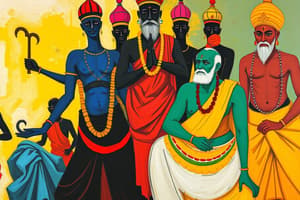Podcast
Questions and Answers
What is the most popular festival celebrated in Bhartiya Samaj that signifies joy, love, and renewal?
What is the most popular festival celebrated in Bhartiya Samaj that signifies joy, love, and renewal?
- Holi
- Eid
- Navratri
- Diwali (correct)
Which aspect of Indian culture is known for its expression through festivals, music, and dance?
Which aspect of Indian culture is known for its expression through festivals, music, and dance?
- Language diversity
- Vibrant spirit (correct)
- Caste system
- Family structure
What is the traditional form of marriage prevalent in Bhartiya Samaj where parents negotiate the terms of the marriage?
What is the traditional form of marriage prevalent in Bhartiya Samaj where parents negotiate the terms of the marriage?
- _Arranged marriage_ (correct)
- Inter-caste marriage
- _Sagai_ marriage
- Love marriage
Which deity is worshipped during the tradition of Ganesh Chaturthi?
Which deity is worshipped during the tradition of Ganesh Chaturthi?
In Indian society, which aspect symbolizes the joining of two families through a sacred institution?
In Indian society, which aspect symbolizes the joining of two families through a sacred institution?
Which festival in India celebrates the victory of good over evil with the lighting of lamps and fireworks?
Which festival in India celebrates the victory of good over evil with the lighting of lamps and fireworks?
What are some of the most cherished values in Indian society according to the text?
What are some of the most cherished values in Indian society according to the text?
What is the hierarchical structure based on historical occupation and social standing in Indian society?
What is the hierarchical structure based on historical occupation and social standing in Indian society?
Who were historically considered outside the caste system in Indian society?
Who were historically considered outside the caste system in Indian society?
In Indian society, which family structure is typically favored?
In Indian society, which family structure is typically favored?
Who usually serves as the head of the family in the traditional Indian family structure?
Who usually serves as the head of the family in the traditional Indian family structure?
What does the Bhartiya Samaj continue to shape according to the text?
What does the Bhartiya Samaj continue to shape according to the text?
Flashcards are hidden until you start studying
Study Notes
Bhartiya Samaj: A Journey through Culture, Traditions, Values, and Social Structure
To understand Bhartiya Samaj, or Indian society, one must delve into the rich tapestry of its customs, traditions, and values that have shaped the nation's identity for millennia. This article explores the cultural, social, and structural aspects of India, focusing on the essential elements that define the Bhartiya Samaj: culture, traditions, values, and the caste system, with a particular emphasis on family structure.
Culture
Indian culture is a complex amalgamation of diverse regional traditions, languages, and beliefs. Spanning from the snow-capped Himalayas to the tropical coastlines, India's culture is as diverse as the land itself. The Bhartiya Samaj is known for its vibrant spirit, which finds expression in festivals, music, and dance. The most popular festivals include Diwali, Holi, and Navratri, which celebrate various aspects of life, such as joy, love, and renewal.
Traditions
Traditions in India are deeply rooted in history and have shaped the social order. Marriage, for instance, is a sacred institution that symbolizes the joining of two families. The most traditional form of marriage is known as arranged marriage, where the parents of the bride and groom negotiate the terms of the marriage. Other traditions, such as Raksha Bandhan and Ganesh Chaturthi, focus on the bond between siblings and the worship of the deity Ganesha, respectively.
Values
The Bhartiya Samaj is guided by a set of core values that have stood the test of time. Respect for elders, non-violence (ahimsa), unity in diversity, and holistic well-being (swasthya) are some of the most cherished values in Indian society. These values have helped shape the nation's ethos and have a significant influence on the daily lives of its people.
Caste System
The caste system, also known as varna, has been a contentious issue in Indian society for centuries. The caste system is a hierarchical structure based on historical occupation and social standing. The four main castes are Brahmana (priests), Kshatriya (warriors), Vaishya (merchants), and Shudra (servants). The Dalits, or untouchables, were historically considered outside the caste system but have since gained greater recognition and acceptance. The caste system has been a source of social stratification and inequality but also serves as a framework for traditional social roles and duties.
Family Structure
Family is the fundamental unit of Bhartiya Samaj. Indian families are typically extended, meaning that they consist of multiple generations living together. The paternal family line is dominant, with the eldest male (usually the grandfather) serving as the head of the family. The joint family system is favored, with members living together, sharing resources, and making decisions collectively.
The Bhartiya Samaj is a vibrant, dynamic, and ever-evolving entity that continues to shape the lives of its people. This article has offered a glimpse into some of the most essential aspects of Indian society, such as culture, traditions, values, and family structure. As we continue to explore the Bhartiya Samaj, it is essential to keep in mind that Indian society is continually adapting to meet the challenges of modernity while maintaining its rich cultural heritage.
Studying That Suits You
Use AI to generate personalized quizzes and flashcards to suit your learning preferences.




